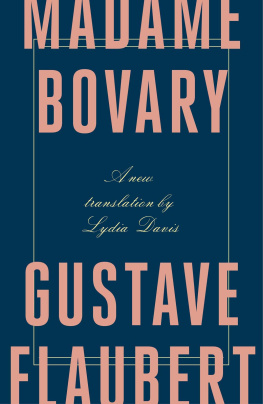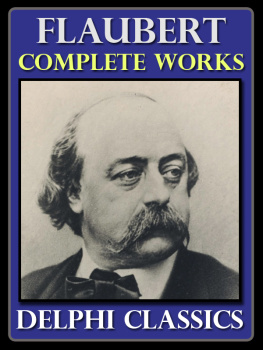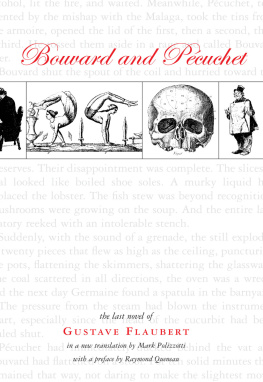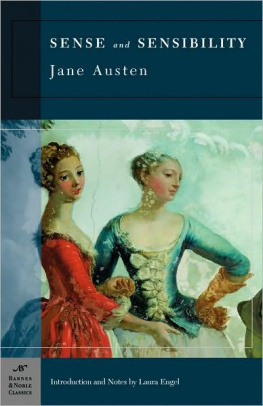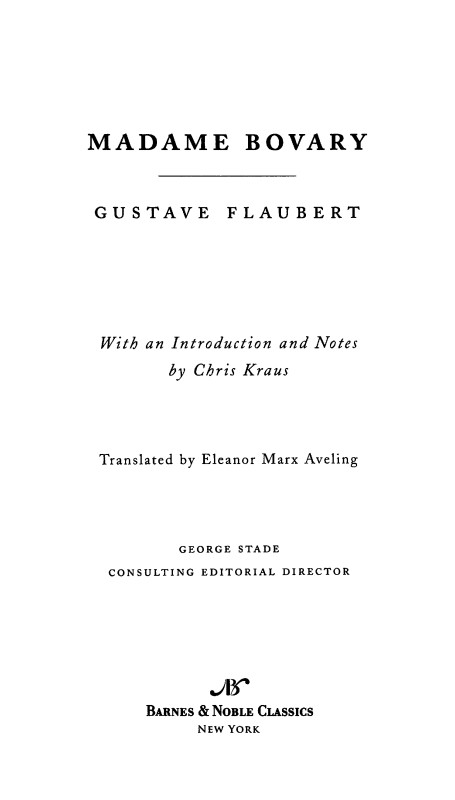
Table of Contents
FROM THE PAGES OFMADAME BOVARY
Emma seated in an armchair (they were putting her things down around her) thought of her bridal flowers packed up in a bandbox, and wondered, dreaming, what would be done with them if she were to die. (page 34)
Before marriage she thought herself in love; but the happiness that should have followed this love not having come, she must, she thought, have been mistaken. And Emma tried to find out what one meant exactly in life by the words felicity, passion, rapture, that had seemed to her so beautiful in books. (page 35)
In their unconcerned looks was the calm of passions daily satiated, and through all their gentleness of manner pierced that peculiar brutality, the result of a command of half-easy things, in which force is exercised and vanity amusedthe management of thoroughbred horses and the society of loose women. (page 51)
Lon was weary of loving without any result; moreover, he was beginning to feel that depression caused by the repetition of the same kind of life, when no interest inspires and no hope sustains it.
(page 112)
She had sent for him to tell him that she was bored, that her husband was odious, her life frightful. (page 173)
Human speech is like a cracked tin kettle, on which we hammer out tunes to make bears dance when we long to move the stars.
(page 177)
She had that indefinable beauty that results from joy, from enthusiasm, from success, and that is only the harmony of temperament with circumstances. (page 180)
She appeared dazzling with whiteness in the empty heavens that she lit up, and now sailing more slowly along, let fall upon the river a great stain that broke up into an infinity of stars; and the silver sheen seemed to writhe through the very depths like a headless serpent covered with luminous scales. (page 183)
Every bourgeois in the flush of his youth, were it but for a day, a moment, has believed himself capable of immense passions, of lofty enterprises. The most mediocre libertine has dreamed of sultanas; every notary bears within him the debris of a poet. (page 268)
Emma found again in adultery all the platitudes of marriage.
(page 269)
There is always after the death of any one a kind of stupefaction; so difficult is it to grasp this advent of nothingness and to resign ourselves to believe in it. (page 301)
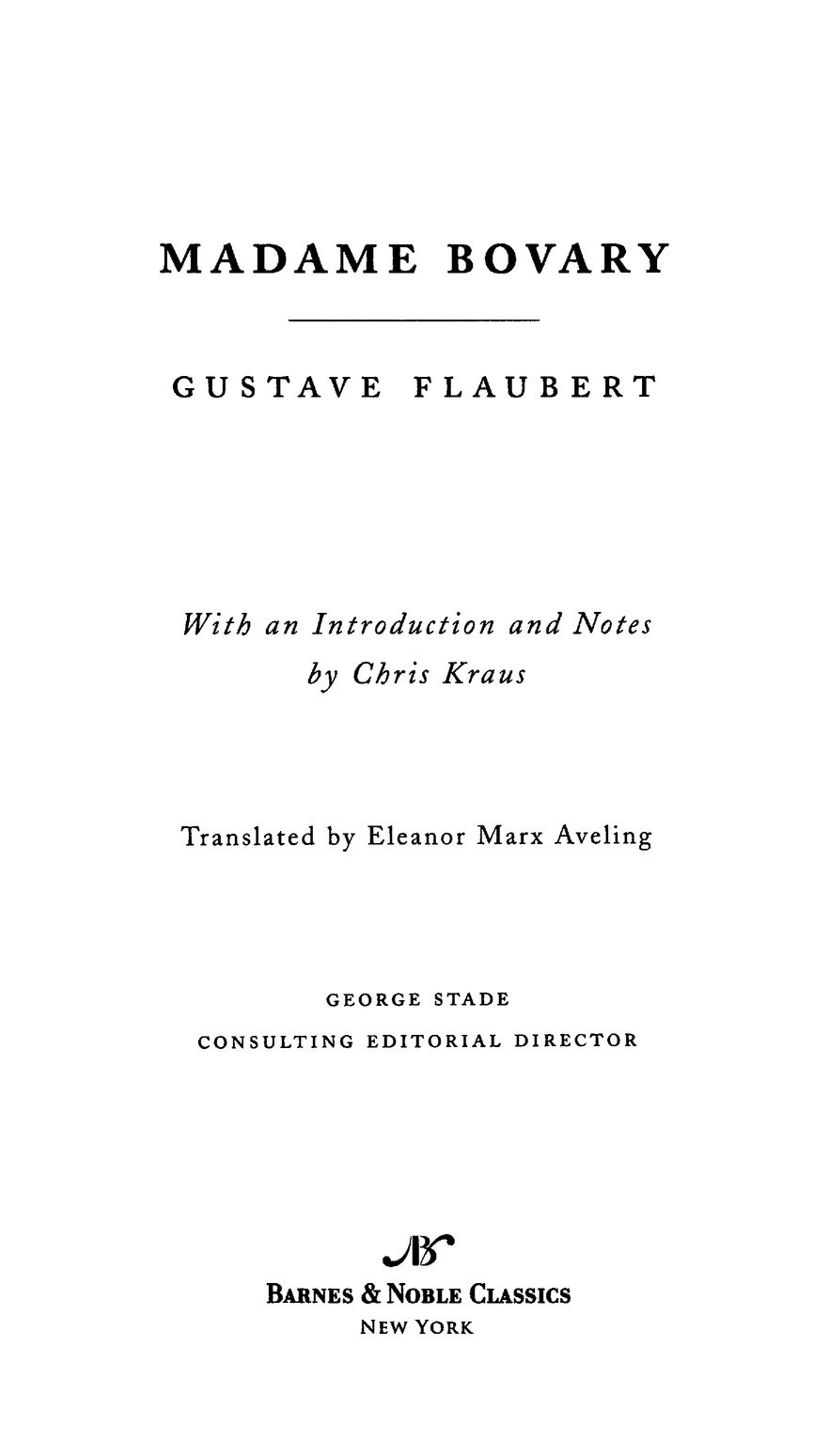
GUSTAVE FLAUBERT
Gustave Flaubert was born in 1821 in Rouen, France. His father, a respected surgeon, raised his family in quarters near the hospital where he worked. Young Gustave would sometimes observe his fathers procedures, including autopsies. The clinical, almost detached detail with which Flaubert depicted Emma Bovary inspired a famous cartoon recalling his childhood experience: Emma on the cadavers block, being dismembered by the surgeons son.
But Gustave was also a deeply romantic young man, and he developed an early and permanent disdain for the life of the French bourgeoisie. Its banalities and exigencies trapped him for a time, as he was encouraged to study law, like many a respectable bourgeois son. However, in 1844 his schooling in Paris came to an abrupt halt when he had a series of health problems resulting in seizures and a coma. These attacks, now thought to be symptoms of epilepsy, required Flaubert to leave school and return to the provinces. Established on his estate in Croisset, he dedicated himself to his true passionliterature.
Flauberts convalescence was soon disrupted. His father died in January 1846, and his beloved sister, Caroline, who had recently given birth, died six weeks later. In his mid-twenties, Flaubert became head of a household that now included his mother and his sisters daughter. Although the three lived a placid country life together for many years, Flaubert often visited Paris, where he fell in love with Louise Colet, cultivated a friendship with writer and photographer Maxime du Camp, and witnessed the Revolution of 1848. He worked for many years on a novel, The Temptation of Saint Anthony (finally published in 1874), that in its early drafts was criticized by his friends for being overly romantic.
Upon returning in 1851 from a tour of the Near East, he began a novel in which he experimented with a new narrative style. Working tirelessly for almost five years, taking great care over each sentence, Flaubert composed his masterpiece, Madame Bovary, the story of a disenchanted provincial wife. When it was published (in installments in 1856, in book form in 1857) Madame Bovary caused a sensation; its frank depiction of adultery landed Flaubert in the courts on charges of moral indecency. Exonerated, the author became a respected frequenter of the Parisian salons, was awarded the French Legion of Honor, and formed friendships with George Sand, Emile Zola, and Guy de Maupassant.
Although he continued to visit Paris frequently, Flaubert lived for most of the year in Croisset, where he wrote and revised his works, and amassed an astonishing body of correspondence. He is also remembered for his novels Salammb (1862) and A Sentimental Education (1869) and for the collection Three Stories (1877). Financial troubles beset him late in his life, and he spent his final years somewhat isolated and impoverished. Gustave Flaubert died on May 8, 1880, in Croisset.
THE WORLD OF GUSTAVE FLAUBERT ANDMADAME BOVARY
| 1821 | Gustave Flaubert is born on December 12 in Rouen, France. His father is a surgeon and medical professor; his mother is from a distinguished provincial bourgeois family. |
| 1824 | Flauberts sister, Caroline, is born. |
| 1829 | Honor de Balzac publishes Les Chouans, his first literary success and the earliest of his works to be included in what he later will call La Comdie humaine (The Human Comedy). |
| 1830 | Victor Hugos Hernani appears, as does Stendhals Le Rouge et le Noir (The Red and the Black). The July Revolution results in the abdication of King Charles X and the establishment of the citizen king Louis-Philippe. |
| 1831 | Hugos Notre-Dame de Paris (The Hunchback of Notre Dame) is published. |
| 1832 | Gustave enters school at the College Royal in Rouen; he studies the ancient Greeks and Romans, and favors such Ro mantic writers as Goethe, Byron, Chateaubriand, and Hugo. |
| 1833 | George Sands Lelia appears. Jules Michelet publishes the first volume of his monumental Histoire de France (History of France); the seventeen-volume work will be completed in 1867. |
| 1836 | Flaubert falls deeply in love with Elisa Schlsinger, eleven years his senior; he later will take her as his model for several of his literary heroines. |
| 1837 | An avid writer from an early age, Flaubert publishes two stories. |
| 18401841 | He begins studying law in Paris. |
| 1844 | Flaubert has his first nervous attack, probably an epileptic seizure. The resulting coma and further illness cause him to |
| abandon his legal studies for the life of a writer at his estate in Croisset, on the River Seine between Paris and Rouen. Le Comte de Monte Cristo (The Count of Monte Cristo), |


